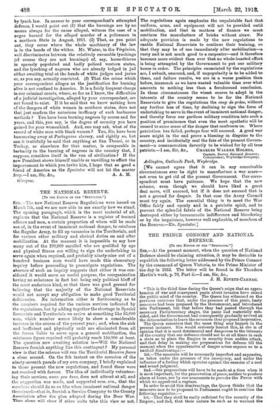lath NATIONAL RESERVE.
[To THE EDITOR OE THE " SPECTATOR."]
Sru,—The new National Reserve Regulations were issued on March 7th, and we are now able to see exactly how we stand. The opening paragraph, which is the most material of all, explains that the National Reserve is a register of trained officers and men, a certain proportion of whom will be made use of, in the event of imminent national danger, to reinforce the Regular Army, to fill up vacancies in the Territorials, and for various other military and clerical duties on and after mobilization. At the moment it is impossible to say how many out of the 190,000 enrolled who are qualified by age and physical fitness are willing to sign the undertaking to serve again when required, and probably ninety-nine out of a hundred business men would have made this elementary inquiry before proceeding to promulgate regulations. The absence of such an inquiry suggests that either it was con- aidered it would serve no useful purpose, the reorganization having no substance in fact but being only political bluff of the most audacious kind, or that there was good ground for believing that the majority of the National Reservists would not accept any obligation to make good Territorial deficiencies. No information either is forthcoming as to the numbers required for the various services indicated by the regulations, but by adding together the shortage in Special Reservists and Territorials we arrive at something like 85,000 men, which number seems likely to show a considerable increase in the course of the present year ; and, when the sick and inefficient and physically unfit are eliminated from all the forces liable to serve upon a general mobilization, tho minimum figure required will probably reach 150,000 at least. The question now awaiting solution is—Will the National Reserve furnish anything like this contingent ? My personal view is that the scheme will run the Territorial Reserve fiasco a close second. On the 9th instant on the occasion of the ninety-seventh parade of my own company, I briefly explained to those present the new regulations, and found these were not received with favour. The idea of individually volunteer- ing their services, rune pro tune, does not attract at all, and the suggestion was made, and supported nem. con., that the members should do so en bloc when imminent national danger threatened—that is, furnish a Service Company to the County Association after the plan adopted during the Boer War. Time alone will show if other units take this view or not. The regulations again emphasize the unpalatable fact that uniform, arms, and equipment will not be provided until mobilization, and that in matters of finance we must continue the manufacture of bricks without straw. No adequate provision is made by the new regulations to enable National Reservists to continue their training, so that they may be of use immediately after mobilization—a rusty nail is not much good to a carpenter—and it therefore becomes more evident than ever that no whole-hearted effort is being attempted by the Government to put our military house in order. The principles enunciated by the regulations are, I submit, unsound, and, if unpopularity is to be added to these, and failure results, we are in a worse position than before, inasmuch as we have wasted valuable time over what amounts to nothing less than a foredoomed conclusion. In these circumstances the wisest course to adopt in the interests of the country seems to be for the National Reservists to give the regulations the coup de grace, without any further loss of time, by declining to sign the form of undertaking to serve in the event of imminent national danger, and thereby force our perilous military condition into such a position of prominence that even the most apathetic will be roused to some sense of the danger that confronts us. Where patriotism has failed, perhaps fear will succeed. A good war scare might in the end prove a blessing in disguise to the country, and incidentally seal the fate of the present Govern- ment—a consummation devoutly to be wished for by all true patriots.—I am, Sir, &e., CHARLES WALKER HOLMES,
Captain, Surrey National Reserve; Commandant, Weybridge Company.
Arlington, Oatlands Park, Weybridge.
[We cannot agree that it can in any conceivable circumstances ever be right to manufacture a war scare— not even to get rid of the present Government. Our corre- spondent must have patience. We hope that the new scheme, even though we should have liked a great deal more, will succeed, but if it does not succeed that is not a ground for despair. In that case the Army Council must try again. The essential thing is to meet the War Office fairly and openly and in a patriotic spirit, and to prevent the splendid fabric of the National Reserve being destroyed either by bureaucratic indifference and blundering or by the impatience, however well explicable, of members of the Reserve.—En. Spectator.]














































 Previous page
Previous page